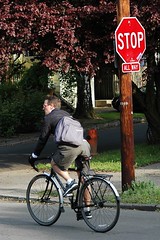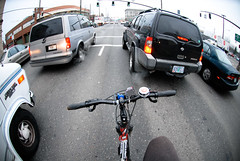
The bike world is buzzing today after a Sunday New York Times opinion piece by Randy Cohen laid out his personal, ethical case for riding illegally. In, If Kant Were a New York Cyclist, Cohen, formerly “The Ethicist” columnist at the paper, wrote:
“I treat red lights and stop signs as if they were yield signs. A fundamental concern of ethics is the effect of our actions on others. My actions harm no one. This moral reasoning may not sway the police officer writing me a ticket, but it would pass the test of Kant’s categorical imperative: I think all cyclists could — and should — ride like me.”
Not surprisingly, Cohen’s piece has spurred lots of reaction from both sides of the debate. Reuters’ Felix Salmon offered a thoughtful rebuttal to Cohen, writing that, “If Cohen wants to agitate for a change in the rules, I’ll join him and support him. But I’m not going to pretend that it’s OK to break the rules just because you think the rules should be changed.”
Interestingly, my mind was already on this topic (even more than usual) because of a letter to the editor published in The Oregonian on Friday. The letter, From a bicyclist: Why I still run red lights and stop signs, was written by a man who said he used to obey all traffic laws until he got tired of breathing toxic exhaust from cars and trucks while waiting at lights and stop signs:
“Time after time, sitting at a light or stop sign, the signal to go is marked by the car next to me stepping on the gas and blowing a cloud of burnt gasoline in my face. It didn’t happen once or twice, but at every intersection, in every instance. Burnt gasoline, burnt diesel oil, from big cars, little cars, from cars, trucks and buses, I was being gassed at every opportunity. After a week, I resumed my scofflaw ways.”
I can relate to both reasons for not always obeying these traffic laws; but I err on the side of advocating for the laws to change rather than to encourage others to break them.
The other day while biking down NW Germantown Road, there was a long backup of cars. The road is very narrow, and given that there’s often a ditch in the shoulder, I wasn’t able to squeeze by on the right. Instead, I sat behind cars for many minutes before getting through. There was no escaping the tailpipes and their toxic exhaust. I could smell it and I could taste it. It even made me a bit dizzy. I’ve breathed exhaust at urban intersections as well. Each time, I’ve wondered, ‘Why should my mode of travel make me susceptible to harmful toxic fumes to any greater extent than is absolutely unavoidable?’ and, ‘Do our existing traffic laws take this serious public health issue into account?’
As for Cohen’s ethical argument; I see it more as a common sense argument, similar to why many people (including the French) support an Idaho stop law. Unlike the completely bogus, yet decades-old bike advocacy mantra of “Same roads, same rights, same rules,” the truth is bicycles and cars are wildly different vehicles that often have separate areas of operation and very different legal standing while on them.
I think it’s a bit silly for people to expect a similar rate of compliance from bicycle operators when the system they operate in (in the social, legal, and physical sense) has been designed for a completely different type of vehicle. Unfortunately, American traffic laws and roadway culture haven’t kept up with huge changes in how we get around. Until they catch up, this debate will continue.



